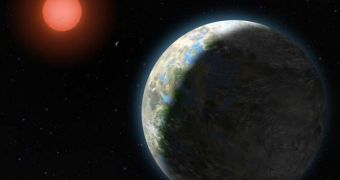According to investigators, it could be that the month of October 2010 will mark a historic moment in exoplanetary research, when the 500th extrasolar planet is discovered orbiting its parent star.
The first such planet was discovered less than two decades ago, but the past few years have been especially prolific in identifying even more of the bodies.
Astronomers say that 494 exoplanets have been discovered until October 12, adding that, with a little luck, the number could exceed 500 by the time the month is out.
This year alone saw the discovery of 70 new exoplanets, and so discovering an additional six within the next two weeks is not impossible. If that doesn't happen now, it will surely happen in November.
“Where we are, I'd expect that by the end of October, we'll be at 500 if things keep going the way they're going,” explains scientist Jon Jenkins.
He is the lead analyst for the NASA Kepler Telescope, which is a mission destined specifically to find Earth-like exoplanets around distant stars. Jenkins also holds an appointment with the SETI (Search for Extraterrestrial Intelligence) Institute.
The expert goes on to say that that 1,000 mark could also be reached sooner than anyone thinks. The Kepler mission has thus far produced substantial amount of data.
Hundreds of potential exoplanetary candidates have been identified by the observatory, but these star systems still need to be observed using other space telescopes, so as to confirm the findings.
Another thing that is worth mentioning is that the Kepler mission was only launched in March 2009, which means that it has been surveying the sky for about a year and a half.
If this single instrument found no less than 700 “planetary candidates” in about 20 months, then is stands to reason that several telescopes spending years in space would find thousands of new exoplanets each.
“One could reasonably expect many of these to be vetted within the next year or so,” Jenkins says of the efforts to validate the Kepler findings by using other observatories.
The new discoveries are also helping astronomers form a more correct view of our own solar system, which has until now been considered to be unique and outstanding.
“We have a sense now that our solar system isn't such a weirdo. It may be that multi-planet systems are quite common,” the SETI Institute expert concludes, quoted by Space.

 14 DAY TRIAL //
14 DAY TRIAL //